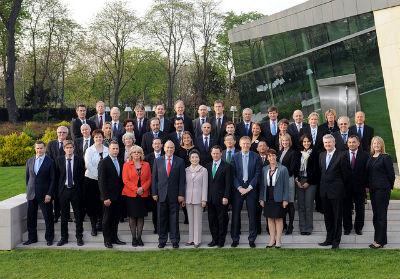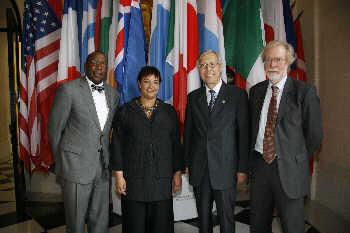EPA's Role with the Organization for Economic Cooperation and Development (OECD)

2012 OECD Environment Ministerial
In March 2012, OECD hosted environment ministers from OECD member countries, as well as senior officials from several non-member countries and high-level representatives from civil society and the private sector, for a Ministerial-level meeting on “Making Green Growth Deliver”. Former EPA Administrator Lisa P. Jackson led the U.S. delegation.
- In addition, this Ministerial served as the official launch of the OECD’s “Environmental Outlook to 2050: Consequences of Inaction.” Exit
- Ministers discussed the Rio+20 Conference on Sustainable Development and how the OECD could support the outcomes of the Conference.
- To that end, much of EPOC’s future work will follow through on the principles and recommendations laid out in “Towards Green Growth” Exit and the “Environmental Outlook to 2050.” Exit
High-Level Joint Meeting of the OECD

The OECD hosted a Joint High-Level Meeting of its Development Assistance Committee (DAC) and Environment Policy Committee (EPOC) at its headquarters in Paris in 2009.
Former EPA Administrator Lisa P. Jackson co-led the U.S. delegation with then-Acting Administrator for U.S. Agency for International Development (USAID), Alonzo Fulgham.
Administrator Jackson was a keynote presenter on the topic: “Supporting Low-Carbon Development Paths: Win-Win Approaches to Achieve both Mitigation and Development Objectives.” In her remarks, the Administrator explained the intertwined connections between the global financial crisis and climate change, the urgent need for international cooperation to address both, and steps being taken by the Obama Administration to address these challenges.
Climate Change (particularly focused on OECD’s expertise in economic analysis) and Green Growth emerged as key issues for future joint work. Senior officials formally adopted a “Policy Guidance on Integrating Climate Change Adaptation into Development Cooperation.” Exit
This meeting also reviewed progress undertaken since the last Joint High-Level meeting (April 2006). Officials adopted:
- a “Declaration on Integrating Adaptation to Climate Change into Development Cooperation" (PDF) Exit and
- a “Framework for Common Action on Shared Goals."
Following that meeting, an ongoing work program was crafted to focus on three key areas:
- Integrating Adaptation to Climate change in Development Cooperation;
- Sustainable Financing to Ensure Affordable Access to Water Supply and Sanitation; and
- Governance Capacity Development for Environment and Natural Resources Management.
About EPOC
EPA’s Office of International and Tribal Affairs (OITA) leads the U.S. engagement with the OECD’s Environment Policy Committee (EPOC). Exit Founded in 1971, EPOC has a long history of promoting effective and economically efficient policies to respond to important environmental concerns. OITA works with a number of other EPA offices and U.S. agencies to guide the policy work of EPOC and provide technical expertise to reports and publications.
EPOC meets 1-2 times per year to review progress on current projects and programs, and to provide direction for future work. Much of the substantive work is undertaken by EPOC’s Working Parties and other subsidiary bodies. Representatives from EPA and other U.S. agencies serve as U.S. delegates to the Working Parties and participate in meetings as technical experts.
- See a diagram of EPOC’s Structure (1 pp, 87 K, About PDF). Exit
Among EPOC’s most important policy contributions is the “Environmental Outlook to 2050: Consequences of Inaction.” Exit By utilizing the organization’s advanced economic and environmental modeling capabilities, the report paints a stark picture of the state of the global environment in the year 2050 if the international community continues to operate in a “business-as-usual” approach to economic development, and provides policy recommendations for growing the global economy more sustainably.
The OECD’s work on Green Growth Exit is an example of OECD Committees, including EPOC, working together on an important international issue that impacts nearly all aspects of the global economy.
- The main report, Towards Green Growth, Exit is a strategy for both developed and developing countries designed to promote economic growth and development in a manner that conserves, protects and strengthens the natural resources and ecosystem services that underpin development.
- This work has included assisting in the development of “green growth indicators” Exit that help policy makers and citizens track progress towards more sustainable economies.
Other EPA Activities with OECD
Besides leading U.S. Government participation in EPOC, EPA engages with the OECD to address a range of important issues, including:
Waste
Pesticides
Toxics Release Inventory
Learn More
Contacts
For additional information on EPA's work with International Organizations, contact:
Joe Ferrante
U.S. Environmental Protection Agency
Office of International and Tribal Affairs (2670R)
1200 Pennsylvania Ave., NW
Washington, DC 20460
E-mail: ferrante.joe@epa.gov
(202) 564-6600
